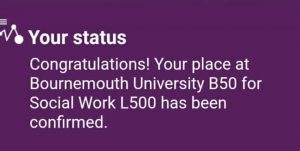Whether you’re applying for university straight from 6th form, college, or are a mature student, the experience can be daunting, especially if you’re applying without assistance from your college. Now you’ve decided to go to university and what you’d like to study, the application process begins. There are two deadlines, dep ending on where and what you’d like to study. For the majority of courses, when applying for September 2022 entry, the current deadline is 26 January 2022 1800 (UK time). For those wanting to apply to any course at the universities of Oxford and Cambridge, or for most courses in medicine, veterinary medicine/science and dentistry the deadline is 15 October 2021 1800 (UK time). You can check when the deadline is by searching your chosen course on the university website.
When I applied for my undergraduate course (BA (Hons) Social Work) during winter 2018, I realised how fast the courses fill up, particularly ones with limited spaces for funding/placement reasons. By March 2019, the course at BU had filled their last place and prospective students interviewing in the later months were being waitlisted. This isn’t for all courses, however, as some courses have hundreds of spaces, although, it is worth being mindful that certain courses can only take 30-40 students, such as my course! My best advice here, is to apply in plenty of time so you’re invited to the early interviews, should your course require an interview. Interviews for Health & Social Care courses typically start in early December.
If you happen to miss the original deadline for the course, it’s still worth reaching out to the university to enquire if they have spaces! If they do, there’s no harm in applying after the January deadline. The final deadline for late applications is 30 June 2022 1800 (UK time) for a September 2022 start. Any applications that are submitted from 30 June 2022 until 29 September 2022 are automatically entered into ‘Clearing’. You can find information about ‘Clearing’ on university websites.
One thing the admission teams look for when reviewing and shortlisting applications, from my experience, is your qualifications, your knowledge and commitment to the subject discipline, evidence of understanding the course and your future career prospects, your personal statement demonstrating specific examples around your passion, motivation, and enthusiasm for wanting to study this course, and the ability to articulate a well written, fluent personal statement.
I personally applied for my course with my grades slightly below the entry requirements, but the feedback I received was my experience and examples I could give in my personal statement carried me through the process onto the course. It’s important to remember, as much as the grades are important, they only make up a part of your application and the university are trying to get a sense of who you are from your application and what motivates you and your personal development outside your academic achievements.
Stage one is to register with UCAS. You can do this here: Sign in | UCAS You will then be required to fill out your personal details, add your education history, complete your employment history, select your course and university choices – these can be up to 5. There is no preference order needed here and the universities won’t be able to see where else you’ve applied for until after you’ve responded to offers.
The next stage is probably the most important, the personal statement. It’s where the admissions team will get a feel for who you are and your personality. The only requirements are it’s between 1,000-4,000 characters or 47 lines – whichever comes first. It might be worth noting that the application doesn’t have a spell check, so it might be worth starting in Microsoft Word or another programme that offers spell check and then copying and pasting it over. A key point when writing this is to look at what qualities, skills and experience the course requires, and don’t just list these, make sure you use clear examples to demonstrate your abilities. You can find out more about how to write a personal statement here: How to write a UCAS Undergraduate personal statement | Undergraduate | UCAS
Once you’ve completed all these sections, you’re all set to submit your application with your chosen reference. You can use an employer, tutor, teacher, volunteer supervisor or trainer to be your reference but bear in mind you risk your application being cancelled if you use a family member or friend. There is a fee to submit your application, it currently starts at £22 for a single course choice or £26.50 for more than one choice.
Now you have submitted your application, you just need to sit back and wait for your offers to come rolling in. There’s no set waiting time for universities to respond, some students will hear back in three days and others several weeks and it isn’t a reflection of your application. The earlier you send your application, the sooner you can expect to hear, as the closer to the deadline, the busier the admissions teams become.
Any offers made will be displayed in the ‘Your Choices’ section of UCAS Hub. You cannot respond to your offers until you have received an answer from all your choices. Once all offers have been made, UCAS Hub will update so you can make a ‘Firm’ and ‘Insurance’ choice. Your ‘firm’ choice is your first-choice university, if you meet the conditions of the offer, your place is secured and will be updated. Your insurance choice is your back-up choice. An insurance choice is optional, but if you don’t meet the requirements of your firm choice and you do your insurance, you will be expected to go to your insurance choice, so pick somewhere you’d be happy to go to!

Most conditions of your offers will be based around your grades, especially if you are waiting on exam results, so your conditional offer may not be updated to unconditional until your exam results day. For those that have met their academic entry requirements already, a condition could be a second employer reference or potentially an interview!
Every course interview is different, some are just an informal chat about the course, your interests and to get a feel of who you are and how you’d fit in. Others, much alike my course, was a bit longer. From my experience, my interview consisted of a group discussion, a written examination and a 1:1 interview. The best advice I received from the lecturers before was to speak out and allow yourself to be heard. They’re not that there to catch you out, and a high majority of those invited to interview for Social Work at BU will be offered a place on the course as you have already demonstrated on paper in your personal statement that you have the ability to be successful on this course, therefore it is more a day to meet the course leads and to explore the course in more detail to see if it is right for you. There is typically one interview day a month, and if you’re invited to one, it’s positive – you’ve been shortlisted! Not every course requires an interview though, so don’t be disheartened if you’re not invited to an interview, as many courses will make offers based solely on your application.
When applying, remember the course leads are always available to talk to through email and you can often find their contact details on the application section of the course website. You can also request feedback if you did not get accepted into one of your choices. There are plenty of opportunities through open days, campus tours and even some taster sessions where you can talk to the academics on your course and current students to help with your decision making.
request feedback if you did not get accepted into one of your choices. There are plenty of opportunities through open days, campus tours and even some taster sessions where you can talk to the academics on your course and current students to help with your decision making.
I hope this has helped answer any queries on the application process. Good luck with your applications!

 Why extra curriculum activities are important for your personal statement
Why extra curriculum activities are important for your personal statement My uni interview tips
My uni interview tips How do I know if uni is for me?
How do I know if uni is for me?








